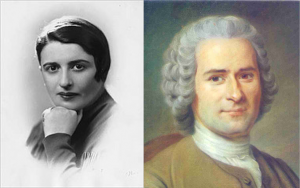The May 12 issue of Time Magazine included an article titled, “American Capitalism’s Greatest Crisis.” It included the following:
A couple of weeks ago, a poll conducted by the Harvard Institute of Politics found something startling: only 19% of Americans ages 18 to 29 identified themselves as “capitalists.” In the richest and most market-oriented country in the world, only 42% of that group said they “supported capitalism.” The numbers were higher among older people; still, only 26% considered themselves capitalists. A little over half supported the system as a whole.
Based on these data, the reporter concluded, “This is a majority of citizens being uncomfortable with the country’s economic foundation.” What the reporter failed to realize is current economic principles and practices are NOT what the the founders viewed as the overarching philosophy on which American society should be based. Remember, Ayn Rand’s Atlas Shrugged, which is touted by many conservatives as holding the keys to American economic exceptionalism was published 168 years AFTER adoption of our Constitution. When was the last time the “foundation” of any structure was added a century and a half after the enterprise opened for business?
Adams, Jefferson and Franklin relied more heavily on Jean Jacques Rousseau’s The Social Contract, in which the French philosopher espoused the importance of community responsibility to the survival of civilized societies. Rousseau did not believe capitalism and socialism were incompatible. Instead, he saw them as complementary.
If this philosophy is applied to the topics of wealth and taxation, the world is not made up of “makers” and “takers.” Everyone is a “maker.” Businesses use private capital (i.e. investment) to produce goods and services. Likewise, government uses public capital (i.e. tax revenues) to provide basic services such as national security, police, fire production and education as well as infrastructure (e.g. highways, airports, water and sewer systems) without which commerce would not exist.
In the 2012 election, President Obama muddied the waters when he suggested that business owners “did not build that.” While he argued the sound bite had been taken out of context, it opened the door for opponents to argue he did not value the importance of private initiative. Here’s what he should have said. “Together we build a strong economy. Privately held businesses marshall resources to fulfill the needs and desires of the marketplace. Yet, at the same time, governments and non-profit organizations deliver public goods and services so the private sector can focus on what it does best.”
The private sector is the primary job creator. But just as President Obama misspoke when he tried to explain the the synergy between the public and private sectors, Republicans have done an equally bad job of articulating the role of the private sector in job creation. First, it is not only the wealthy who are the “job creators”. Entrepreneurs emerge from every income tier. Second, business owners create two categories of jobs. They employ personnel DIRECTLY in their companies. When they pay taxes, they also INDIRECTLY create public sector jobs and should be given credit for that.
If there is anyone who should be labeled “takers,” it is those individuals and companies who can well afford to pay their fair share of taxes, yet avoid them and shift the financial burden of public goods they use in the course of business to other citizens. I can hear Rousseau now. “You are violating the contract on which civilized societies depend. Return to it and all those young people just might begin to realize that capitalism is critical to the world in which they live. Next year, Time will have articles about how capitalism survived this crisis.”
For what it’s worth.
Dr. ESP
